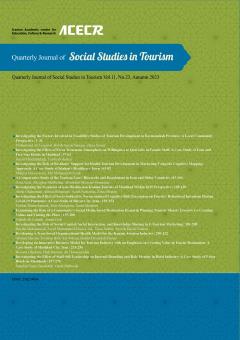Developing an Innovative Business Model for Tourism Industry with an Emphasis on Creating Value in Tourist Destination: A Case Study of Mashhad City, Iran
Subject Areas :
hossein ghadami
1
![]() ,
hadi bastam
2
,
Ali Hosseinzadeh
3
,
hadi bastam
2
,
Ali Hosseinzadeh
3
1 - Islamic Azad Universitu Torbat-e Heydarieh Branch
2 - Inistitued of Tabaran
3 - Islamic Azad University Torbat-e Heydarieh Branch
Keywords: Innovative Business, Value Creation, Tourism Industry, Tourism Destination,
Abstract :
As one of the most important industries worldwide, the tourism industry has led to the rapid growth of economic development, preparing the grounds for the development of new businesses, which has proved very effective in expanding job opportunities for different walks of life. Therefore, this exploratory study sought to develop an innovative business model for the tourism industry with an emphasis on creating value in the destination using a grounded theory method. The required data were collected through library studies and semi-structured interviews. To this end, open and in-depth interviews were made with 16 experts until the theoretical saturation was reached. The participants comprised experts of the tourism industry, university professors, hotel managers, guides of travel agencies and tours, heads, and officials of tourism industry departments, and tourists, who were selected via purposive sampling. The collected data were thematically analyzed according to open, axial, and selective coding. Finally, the conceptual model of the study was developed based on the Strauss and Corbin model, indicating that the core principle underlying the development of diverse advantage-oriented businesses is derived from casual conditions and influenced by contextual factors. It was also found that the core principle could be identified based on some strategies. Moreover, the intervening factors were extracted from the textual data collected from the interviewees by identifying the categories that indicate environmental conditions.
امیرالسادات، نسیم؛ شفیعی، میثم؛ حاجی پور، بهمن و سلطانی، مرتضی. (1398). «شناسایی و الگوپردازی انگیزههای مصرفکنندگان برای مشارکت در خلق مشترک ارزش در صنعت نوشیدنی؛ شرکت زمزم ایران». تحقیقات بازاریابی نوین. دوره-ی9، شماره 2. صص 53-76.
آسیابانی، زهرا و بهرامیان، زهره. (1398). «بررسی فرصتها و چالشهای توسعه صنعت گردشگری در راستای کارآفرینی پایدار». اولین کنفرانس بین المللی گردشگری بیابان لوت؛ فرصتهای محلی و بین المللی، دانشگاه بیرجند.
رحماني، بیژن؛ مريدسادات، پگاه و شاهد، سیدحسین. (1397). «سازههای مؤثر بر کارآفريني در مناطق گردشگري شهرستان همدان (مطالعه موردي مناطق گردشگري بخش مرکزي)». نگرشهای نو در جغرافياي انساني. دوره ی10، شماره 2. صص 251-239.
عسگری، رسول؛ شمس الدینی، علی و کردوانی، پرویز. (1397). «ارائه مدل آینده¬نگر کارآفرینی مبتنی بر بوم¬گردی در روستاهای هدف گردشگری (مطالعه موردی: روستاهای گردشگری شهرستان خوروبیابانک)». فصلنامه برنامه¬ریزی منطقه¬ای. سال 8، شماره¬ی 31، صص 102-91.
فروغ زاده، سیمین. رضوی زاده، ندا. (1393). «گونه شناسی شهری، کاربست مدل نهادی کوهن». مجله برنامه¬ریزی و توسعه گردشگری. سال سوم، شماره 9 صص 190-169.
Braun, V. & Clarke, V. (2006), Using thematic analysis in psychology,
Qualitative Research in Psychology, Vol. 3, No. 2, PP. 77-101.
Bosworth, G., Farrell, H., (2011). Tourism entrepreneurs in Northumberland. Ann. Tour. Res. 38 (4), PP.1474–1494.
Casaisa, B., Juliana, F., Mariana, S., (2020). Tourism innovation through relationship marketing and value co-creation: A study on peer-to-peer online platforms for sharing accommodation. Journal of Hospitality and Tourism Management. 42, PP.51-57.
Dapiran, G, P., & Kam, H. B. (2017). Value creation and appropriation in product returns management. The International Journal of Logistics Management, 283, PP. 821-840.
Etgar. M. (2008). A descriptive model of the consumer-production process. Journal of the Academy of Marketing Science. 9, PP. 77–680.
Getz, D., Petersen, T., (2005). Growth and profit-oriented entrepreneurship among family business owners in the tourism and hospitality industry. Int. J. Hosp. Manag. Vol. 24, PP.219–242.
Li, L., (2008). A review of entrepreneurship research published in the hospitality and tourism management journals. Tour. Manag. 29 (5), PP. 1013–1022.
Marasco, A., De Martino, M., Magnotti, F., Morvillo, A., (2018). Collaborative innovation in tourism and hospitality: a systematic review of the literature. Int. J. Contemp. Hosp. Manage. 30 (6), PP. 2364–2395.
Mason, M. C., & Paggiaro, A. (2012). Investigating the role of festivals cape in culinary tourism: The case of food and wine events. Tourism Management, 33(6), PP. 1329–1336.
McCormickT.J (2011), A Success-oriented Framework to Enable Co-created eServices, Ph.D. of system engineering, School of Engineering and Applied Science, The George Washington University.
Morenise Puperi, (2017). "Value appropriation in Brazilian cattle industry". British Food Journal, 1199, PP:2089-2101, https://doi.org/10.1108/BFJ-10-2016-0478.
Morenise, P., (2017). Value appropriation in the Brazilian cattle industry. British Food Journal, 1199, PP. 2089-2101.
Payne, A., & Frow, F. (2014). Developing superior value propositions: a strategic marketing imperative. Journal of Service Management. 25(2), PP:213-227.
Pearce, P.L., (2009). The relationship between positive psychology and tourist behavior studies. Tour. Anal. 14 (1), PP. 37–48.
Penny Wan. Y.K. (2013). A Comparison of the Governance of Tourism Planning in the Two Special Administrative Regions SARs of China - Hong Kong and Macao. Tourism Management. 36, PP.164-177.
Silva, C., Abrantes, J. L., & Lages, C. (2009). Push motivations for tourism mountain destinations. In A. Fyall, M. Kozak, L. Andreu, J. Gnoth, & S. Sibila (Eds.). Marketing innovations for sustainable destinations, pp. 2–11.
Staniewski, M. and Awruk, K. (2016). Start-up intentions of potential entrepreneurs – the contribution of hope to success. Economic Research-Ekonomska Istraživanja. 29(1), PP:233-249.
Stylos, N., & Andronikidis, A. (2013). Exploring the cognitive image of a tourism destination. Tourismos: An International Multidisciplinary Journal of Tourism. 8(3), PP. 77–97.
Vada, Sera. Prentice., Catherine., Hsiao, Aaron (2019). The influence of tourism experience and well-being on place attachment. Journal of Retailing and Consumer Services 47, PP.322–330.
Xu, Z., Zhang, J., 2016. Antecedents and consequences of place attachment: a comparison of Chinese and Western urban tourists in Hangzhou, China. J. Destin. Mark.Manag 5(2), PP.86-96.


